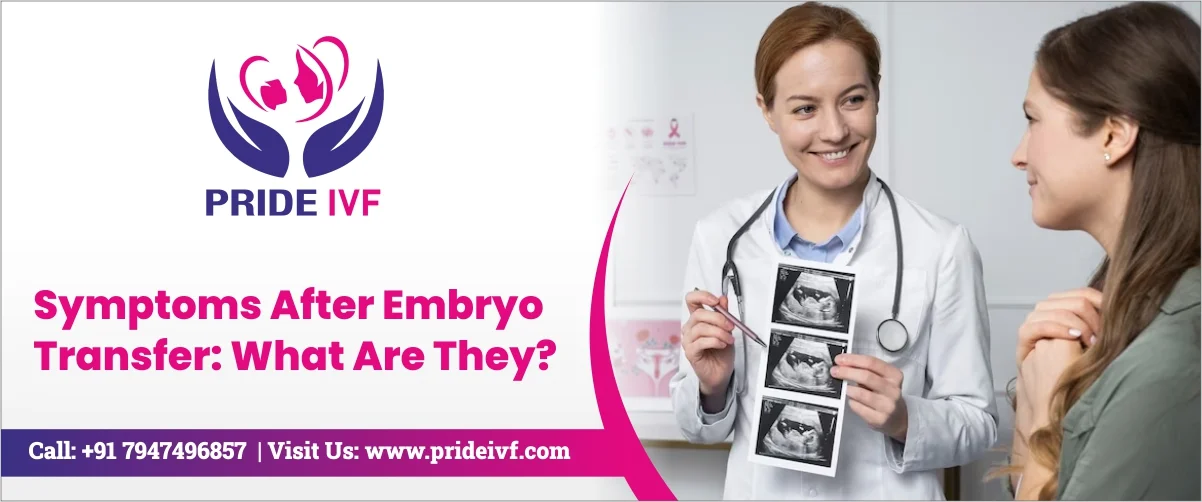Embryo transfer is a pivotal moment in the journey of fertility treatment. It’s the culmination of numerous steps, hopes, and dreams. As anyone who’s gone through it can attest, the days and weeks following embryo transfer are filled with anticipation, hope, and sometimes, uncertainty. In this blog, we’ll delve into the often mysterious realm of after embryo transfer day by day symptoms. What can you expect during the waiting period, and how do you distinguish normal signs from potential red flags? Let’s explore.




The Wait Begins (Days 1-5)
In those first few days after embryo transfer, emotions run high. You’ve made it through the retrieval process and endured the excitement of fertilization. Now, it’s time to wait. While you may not experience much physically during this time, the emotional rollercoaster is in full swing.
Physically, some women report mild cramping and spotting. These symptoms after embryo transfer can be disconcerting, but they are usually quite normal. The cramping can be likened to menstrual cramps and is often attributed to the embryo settling into the uterine lining. As for spotting, it’s often light and can range from pink to brown. It’s caused by the irritation of the cervix during the transfer. While it’s unsettling, it’s typically nothing to worry about.
The Two-Week Wait (Days 6-14)
Ah, the infamous two-week wait – it’s aptly named. This is the period when most women start tuning into their bodies with heightened awareness. Emotions can be all over the map, ranging from optimism to anxiety.
Physical symptoms during this time can mimic early pregnancy signs. Many women report breast tenderness, fatigue, and mood swings. Your body is adjusting to the influx of hormones, especially progesterone, which can cause these symptoms. It’s crucial to understand that these symptoms may not be indicative of pregnancy, but rather a response to the medications you’ve been taking.
The Puzzle of Spotting
Spotting is a topic that often leaves many women puzzled and worried. Is it normal? Should you be concerned? Spotting can vary in color and consistency, from light pink to dark brown. It’s essential to remember that spotting, in most cases, is a common occurrence after embryo transfer. It’s the result of the catheter touching the cervical canal, which can irritate the sensitive tissues.
However, there are instances when spotting can be more concerning, such as if it’s heavy, bright red, or accompanied by severe pain (is ivf painful). In such cases, it’s crucial to reach out to your healthcare provider for guidance and reassurance.
Cramps, Twinges, and Aches
Abdominal discomfort is another common symptom after embryo transfer. This can range from mild twinges to cramping sensations that might remind you of menstrual cramps. Again, it’s easy to get worried when you feel anything out of the ordinary in your abdominal area, especially after such a significant procedure.
Generally, mild cramping and twinges are normal as your body changes after embryo transfer, it adjusts to the presence of the embryo. It’s your uterus preparing to nurture the developing embryo. However, if the cramping is severe, persistent, or accompanied by heavy bleeding, it’s essential to contact your fertility clinic in Delhi promptly.
Less Common Symptoms to Watch For
While we’ve covered some of the more common symptoms, it’s essential to be aware of less common but still significant signs. Some women may experience severe abdominal pain or heavy bleeding. These symptoms should never be ignored. Contact your healthcare provider immediately if you encounter such issues.
The Emotional Rollercoaster Continues
Dealing with symptoms after embryo transfer, whether common or less so, can take a toll on your emotional well-being. It’s a journey filled with ups and downs, and sometimes, it’s easy to feel isolated. Remember, you’re not alone in this. Many women share their experiences and emotions.
It can be therapeutic to connect with others who have gone through or are going through similar challenges. Whether through support groups, online forums, or simply confiding in a trusted friend or family member, sharing your feelings can help ease the emotional burden.
The Hormone Factor
Hormones play a starring role in the fertility treatment process, and they can certainly influence how you feel post-embryo transfer. Progesterone, in particular, can lead to symptoms that mimic early pregnancy. This hormone is essential for maintaining the uterine lining and supporting a potential pregnancy. However, it can also cause breast tenderness, bloating, and mood swings.
It’s important to understand that these symptoms after embryo transfer don’t guarantee a pregnancy. They are more indicative of your body’s response to the medications you’ve been taking. It’s a delicate balance between hope and realism during this time.
The Power of Mindfulness
The emotional toll of fertility treatments, especially after embryo transfer, should not be underestimated. The constant uncertainty can take a toll on your mental health. This is where the power of mindfulness comes into play.
Stress can exacerbate physical symptoms, and it’s vital to find ways to manage it. Mindfulness and relaxation techniques, such as meditation, yoga, or even simply deep breathing exercises, can help alleviate stress and improve your overall well-being. Remember, it’s okay to take a step back and prioritize self-care during this journey.
Lets get started
The Big Test: Should You Take a Home Pregnancy Test?
The urge to take a home pregnancy test can be overwhelming during the two-week wait. You may find yourself staring at the test aisle in your local pharmacy, wondering if you should give in to the temptation. It’s a personal decision, but it comes with its own set of pros and cons.
Taking a home pregnancy test before the official blood test has its advantages. It can offer a glimmer of hope and help you mentally prepare. However, it can also lead to false positives or negatives due to the presence of fertility medications in your system. If you do decide to take one, be sure to follow the instructions carefully and consider the timing.
When to Contact Your Doctor
Throughout this journey, it’s essential to trust your instincts. If you ever feel that something isn’t right, don’t hesitate to contact your healthcare provider. They are there to support you and address your concerns. There are specific signs and symptoms that should prompt immediate contact with your ivf doctor in Delhi, such as severe abdominal pain, heavy bleeding, or severe nausea.
During follow-up appointments, your doctor will monitor your progress and make any necessary adjustments to your treatment plan. Open and honest communication with your healthcare team is key.
Conclusion
In the world of infertility treatment in delhi, the post-embryo transfer period is undoubtedly one of the most emotionally charged and physically sensitive times. It’s a delicate balance between hope and uncertainty, anticipation and anxiety. Remember that you’re not alone in this journey, and it’s perfectly normal to experience a range of symptoms and emotions.
As you navigate this challenging time, prioritize self-care, mindfulness, and open communication with your healthcare team. Trust your instincts, and don’t hesitate to seek guidance when needed. While the path may be filled with twists and turns, it’s all part of the journey toward creating the family you’ve been dreaming of.
If you’re considering fertility treatments or have questions about your fertility journey, consider reaching out to the International Pride IVF Centre. Their experienced and compassionate team is dedicated to helping individuals and couples achieve their dream of parenthood.
Your dream of creating a family is within reach, and with the right guidance, you can turn that dream into a beautiful reality.




